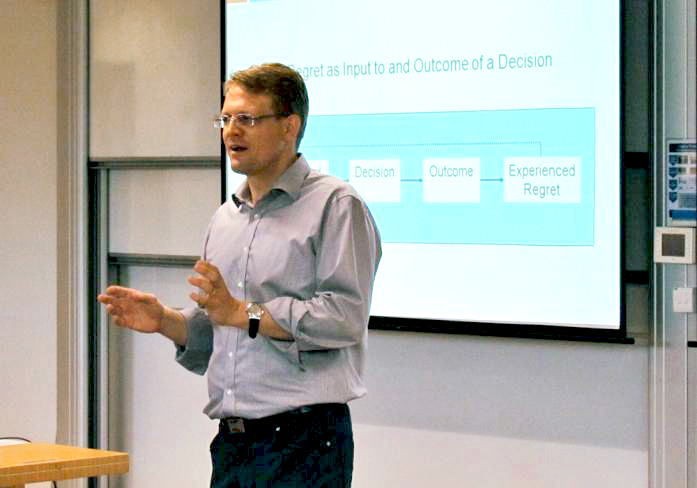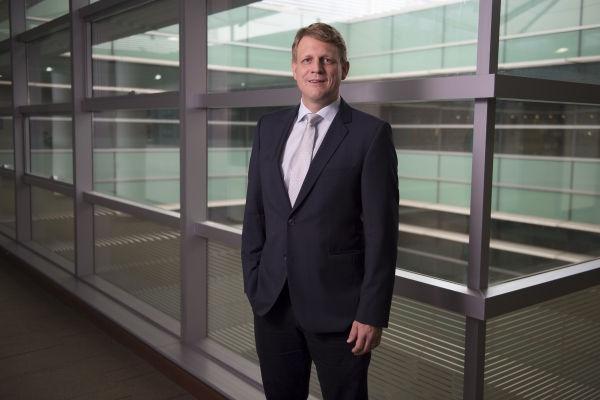In the heart of a bustling city sits a group of people in a circle. Feet pressed firmly but gently on the floor, eyes closed, and hands neatly folded on their laps, they are meditating. This group of people are part of a larger initiative, called the Mindfulness Initiative, an advocacy project aimed at increasing awareness of how mindfulness can benefit society.
In a 2014 article, Singapore Business Review reported that 60% of Singaporeans said that stress is a main contributor to mental fatigue at work. Likewise the stress levels that youth face with the plethora of activities from school to personal life is a handful to cope with, to say the least. This is where Mindfulness comes in.
We chat with Associate Professor Jochen Reb, who heads the Mindfulness Initiative @ SMUon what mindfulness is all about and its positive impact on our daily lives.
Hi Professor Jochen! We’ve been hearing more and more of this term “mindfulness” being used of late. But what exactly is mindfulness and why is it gaining such popularity today?
Mindfulness can be broadly defined as open, present-centred awareness and attention. While mindfulness has long been a cornerstone of contemplative traditions, such as Buddhism, we are now seeing increasing interest from individuals and organisations approaching mindfulness from a secular perspective. This is probably because over the past three decades, research has uncovered a range of benefits of being mindful, including reduced stress and anxiety and improved immune system functioning and mood.
Seems like bigwig companies such as Google, General Mills and Target are now offering mindfulness programmes to their employees. Why are companies beginning to take this so seriously?
For one thing, a lot of employees and executives are increasingly stressed. Mindfulness training can reduce and prevent stress and increase well-being. Also, organisations are offering mindfulness programmes to develop important workplace skills such as emotional intelligence. Mindfulness training can be seen as a form of self-regulation training; and being able to better self-regulate one’s attention is fundamental for developing better emotion regulation (for example, refraining from sending nasty emails when one is upset).
Is this what you’re hoping to achieve too with The Mindfulness Initiative @ SMU? How did it come about?
The Mindfulness Initiative @ SMU was founded about three years ago when several of us realised that a number of individuals within SMU had an interest in mindfulness and that it would be nice to create a community of like-minded people. The vision of the initiative is to make a positive impact on individuals, organisations and society by engaging in research, education, and outreach on mindfulness. We try to take a scientific, evidence-based and open-minded approach towards mindfulness and mindfulness training.

Minfulness session with Professor Jochen Reb
We’ve heard many SMU students and staff talking about the workshops. How does being mindful help the students and staff of SMU?
Over the past weeks, we offered mindfulness workshops for SMU students, staff, and instructors. The lives of all these groups of people can be stressful, especially at certain times, such as the beginning of the term. By learning and engaging in formal and informal mindfulness practices, we can reduce the impact these unavoidable stressors have on our wellbeing. As a result, we can enjoy life more and also be more productive.
Your research also sets out to examine how one’s mindfulness also influences the people around them in the workplace. How have you seen this being exemplified by the people who go through your programmes?
In our research, we take a systematic approach to studying the effects of mindfulness to complement personal experiences and anecdotal evidence. For example, we have found that employees of more mindful leaders felt less emotionally exhausted, were more satisfied with their jobs, and perform better. They also were more likely to help their co-workers and were less likely to engage in unwanted behaviours at work. In current work, we found further evidence that such benefits are at least partly due to mindfulness’ impact on the relationship between leader and employee: the more mindful a leader, the better employees rate the quality of their relationship with their leader.
How about you? Have you benefitted from mindfulness personally?
Definitely. I don’t think I would be spending so much time promoting mindfulness if I did not experience the benefits myself! Mindfulness has helped me to become more aware of dysfunctional thoughts, emotions, and behaviour, and this has enabled me to change some of them. It has also helped me to be more resilient and recover more quickly from stressful or emotional situations. Of course, by no means does this mean that my life is perfect and without challenges.

Jochen Reb, Associate Professor of Organisational Behaviour & Human Resources
Any tips on simple mindful practices that students can do throughout the day?
I am a bit hesitant about sharing practices in this way, as it doesn’t allow for those new to mindfulness to ask questions and share experiences. However, here is one quick practice that a lot of people find helpful. The practice consists of four steps:
- First, stop whatever you are doing.
- Second, become aware of the current state of your body and mind with a sense of curiosity – ask yourself “how do I feel right now?” No need to change anything.
- Third, become aware of your breathing and simply observe the natural flow of your breath for a minute or more, letting go of anything else that has been on your mind.
- Fourth, externalise your attention again from your breath to your body and then your environment.
A lot of people find that this short practice can be very refreshing when done in the middle of a busy day. Students can do this practice, for example, between classes.
Another simple practice is to practise mindfulness while walking from one class to another. Simply let go of your thoughts about what has been (e.g., the last class) and what will be (e.g., the next class), and while walking, become aware of the sensation of walking as well as the environment and nature around you. You may notice things that you have never noticed before, and you may feel re-centred and refreshed after this practice.
What about for those in the workforce?
As general practices that can easily be learnt, I would recommend the same ones as above. Mindfully walking to a meeting can be a nice way to clear one’s mind in preparation for the meeting.
Can mindfulness be applied in our personal life too?
This is a very broad question and the answer most likely differs from person to person.
A lot of people find their lives enriched through formal and informal practices of mindfulness. For example, eating a meal mindfully, with full attention, can be a very enjoyable experience that also makes us aware of how we often rush while eating.
Many people report a positive effect on their interactions and relations with loved ones, such as their friends, children, or partners. For example, rather than thinking about work while at home (and the other way around), they are better able to fully engage in whatever they are doing at the moment, whether that is working or playing with their children.
Finally, any basic tips or advice for people just starting to integrate mindfulness as part of their daily routine?
My advice would be first, to get good instruction on mindfulness from qualified teachers.
Second, to become part of a community of like-minded people. The social support received can be really helpful in maintaining one’s practice and overcoming obstacles.
Third, be playful and experiment. There are so many ways mindfulness can come into our lives. We need not think of mindfulness practice as another item on our to-do list but as an approach to life.
Mindfulness Initiative @ SMU offers programmes and events for individuals and organisations inside and outside of SMU. We also collaborate with organisations on mindfulness-based training and research. Please visit our website at https://business.smu.edu.sg/mindfulness or contact us via email at mindfulness@smu.edu.sg to learn more.










